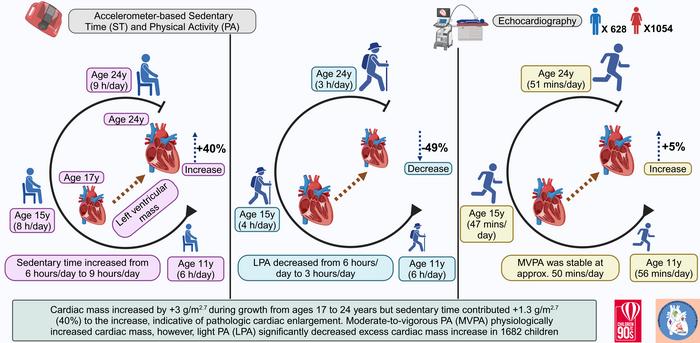An increase in sedentary time from childhood caused progressing heart enlargement, a new study shows. However, light physical activity could reduce the risk. The study was conducted in collaboration between the Universities of Bristol and Exeter, and the University of Eastern Finland, and the results were published in the prestigious European Journal of Preventive Cardiology.

Credit: Andrew Agbaje.
An increase in sedentary time from childhood caused progressing heart enlargement, a new study shows. However, light physical activity could reduce the risk. The study was conducted in collaboration between the Universities of Bristol and Exeter, and the University of Eastern Finland, and the results were published in the prestigious European Journal of Preventive Cardiology.
Left ventricular hypetrophy refers to an excessive increase in heart mass and size. In adults, it is known to increase the risk for heart attacks, stroke, and premature death.
In the present study, 1,682 children drawn from the University of Bristol’s Children of the 90s cohort were followed up from age 11 until 24 years. At baseline, they spent an average of six hours per day in sedentary activities, which increased to nine hours per day by young adulthood. This increase in sedentary time was associated with progressing heart enlargement, contributing 40% to the total increase in heart mass within a 7-year growth period from adolescence to young adulthood. Sedentariness increased heart mass regardless of obesity or elevated blood pressure status.
On the contrary, an average of three to four hours per day of light physical activity (LPA) throughout the follow-up reduced the increase in heart mass by 49%. Higher LPA was also associated with better cardiac function.
Participating in moderate-to-vigorous physical activity (MVPA) showed signs of slightly increasing the heart size, by 5%, which is largely physiologic.
Previous studies in the same population have linked excessive sedentariness to increased inflammation, high insulin, fat obesity, dyslipidaemia, and arterial stiffness. LPA has emerged as an effective approach to diminishing the harmful effects of childhood sedentariness. However, no study in the world has previously examined whether long-term exposure to LPA from childhood holds the potential to reverse the increase in cardiac mass. This is because repeated echocardiography assessments of the heart in a large population of healthy youth are rare.
The current study is the largest and the longest follow-up accelerometer-measured movement behaviour and repeated echocardiography study in the world. The participants wore accelerometer devices on their waists at ages 11, 15, and 24 years for 4–7 days and had echocardiography measurements of the heart structure and function at ages 17 and 24 years. Their fasting blood samples were also repeatedly measured for low-density lipoprotein cholesterol, high-density lipoprotein cholesterol, triglycerides, glucose, insulin, and high-sensitivity C-reactive protein. Blood pressure, heart rate, smoking status, socio-economic status, family history of cardiovascular disease, as well as dual-energy X-ray absorptiometry measured fat mass and lean mass were accounted for in the analyses.
“There is growing evidence that childhood sedentariness is a health threat that needs to be taken seriously. There must be a paradigm shift in how we view childhood sedentariness, as the mounting evidence is pointing at a ticking time bomb,” says Andrew Agbaje, an award-winning physician and associate professor (docent) of clinical epidemiology and child health at the University of Eastern Finland.
“LPA is an effective antidote to sedentariness. It is easy to accumulate three to four hours of LPA daily. Examples of LPA are outdoor games, playing in the playground, walking a dog, running errands for parents, walking and biking to the shopping mall or to school, taking a stroll in the park, playing in the forest, gardening, casual basketball, soccer, floorball, golf, frisbee, etc. We can encourage children and adolescents to participate in LPA daily for better cardiovascular health,” Agbaje says.
Dr Agbaje’s research group (urFIT-child) is supported by research grants from Jenny and Antti Wihuri Foundation, the Finnish Cultural Foundation Central Fund, the Finnish Cultural Foundation North Savo Regional Fund, the Orion Research Foundation, the Aarne Koskelo Foundation, the Antti and Tyyne Soininen Foundation, the Paulo Foundation, the Yrjö Jahnsson Foundation, the Paavo Nurmi Foundation, the Finnish Foundation for Cardiovascular Research, Ida Montin Foundation, Eino Räsänen Fund, Matti and Vappu Maukonen Fund, Foundation for Pediatric Research, and Alfred Kordelin Foundation.
Journal
European Journal of Preventive Cardiology
Article Title
Accelerometer-based Sedentary Time and Physical Activity from Childhood through Young Adulthood with Progressive Cardiac Changes: A 13-Year Longitudinal Study.
Article Publication Date
7-May-2024



